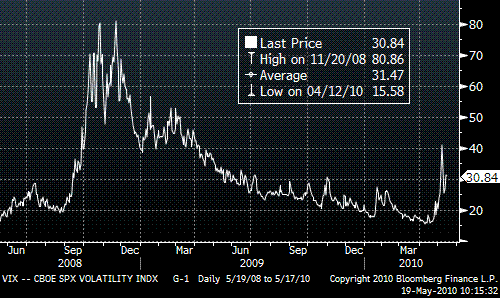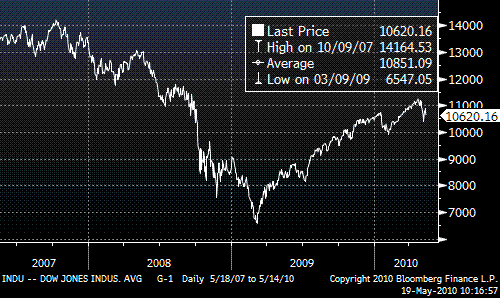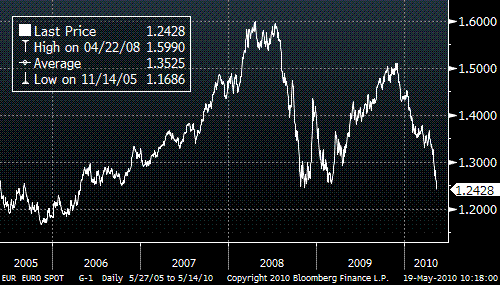The following is a posting by Kevin Scully, executive chairman of NRA Capital, on his blog yesterday, and it is reproduced here with permission.
Investors are over-reacting negatively to the EU's US$1 trillion rescue package announced last week !!??

I was asked yesterday during a TV interview about why the market was reacting so negatively to the EU's US$1 trillion rescue package.
The VIX initially fell to below 30 after it rocketed to above 40 and is now just trading above the 30 level.
A fall below 30 would signal to me that sentiment is improving.

Key concerns that caused the collapse of the Euro and heightened market volatility were comments from DB that Greece would not be able to repay its debt and could even head for bankruptcy. I think investors have very short memories about the crisis facing global stock markets in late 2008 into 2009.
The chart below of the Dow shows what happened to the index during the financial crisis in mid 2008. I have included it here to refresh memories.

When the crisis first surfaced - then US Treasury Secretary Paulson announced a rescue plan but as he became a lame duck - new Treasury Secretary Geithner announced his own plan after he took office in early 2009 - but investors were skeptical about the lack of detail. There were then a number of supplementary packages which were the catalyst for that big rally in March 2009.
To me this is what is happening in the EU now - first stop the panic and bring some stability to the market - I think the US$ 1 trillion package does that because it gives money to the countries to finance their debts.
This has to be phase 1 - once the markets have been calmed - then we should see supplementary packages meant to address the more important long term structural issues.
From the US experience, it would appear that it would take about six months before the EU and the Euro stabilise. I will now be watching out for supplemental measures to bolster the US$1 trillion package
Will Greece go bankrupt? Will this be aggravated by the collapse of the Euro?
The chart below shows the collapse of the Euro compared to the US$. It looks like $1.20 is where some support will be found. Ironically a weak Euro is good for Greece because the largest sector in the economy is tourism. Its major trading partners are also EU members.
In fact a weak Euro is good for the EU because it would make their exports more competitive. So this could be an unexpected upside surprise for the economy. Notwithstanding that however, the national debt is large so it may take several years for the debt position to improve.
The only saving grace now is that its economy is about 0.3% of the world economy. I would be worried if Germany or France has national debt issues because they are significant contributors of Global GDP.

On balance, I think the Greek and EU crisis will be resolved and we should see some stability back in the markets by Q3-2010. The good news is that stock markets such as the Dow or even Singapore are not expensive in PER terms at about 13 to 14 times 2010 earnings. The market weakness has also been aggravated by the significant decline in stock market volumes as many investors remain sidelined awaiting more information about Greece and the EU rescue packages. This has increased the volatility in the indices.
Medium to long term investors can bargain hunt - after all the Singapore Q1-2010 results season showed that many companies reported stronger and better earnings. Traders will however find it harder because of the low liquidity.



